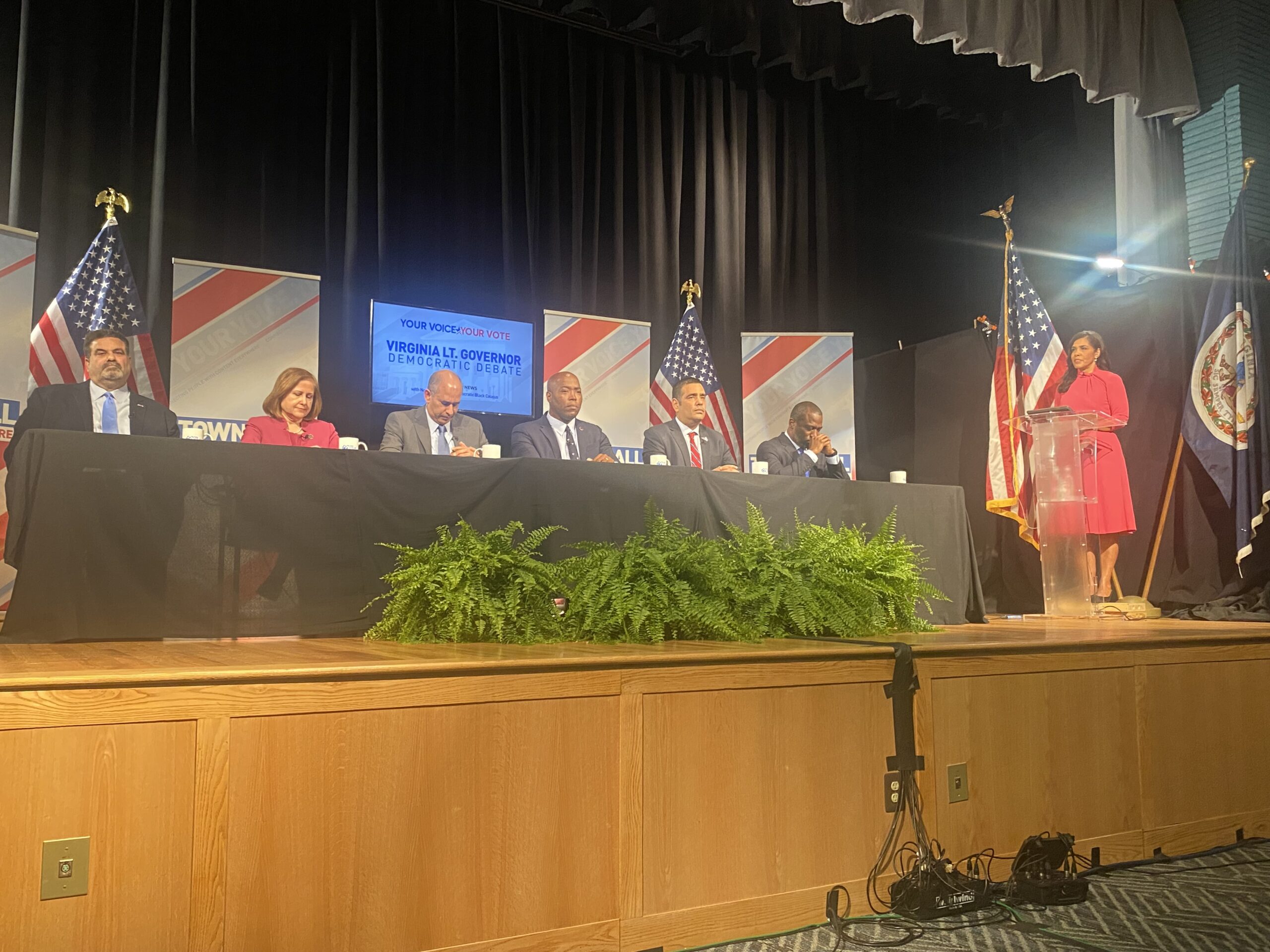Editorial: No Matter Who Wins, Virginia Loses
The Virginia gubernatorial election is just a month and a half away, and the field is looking as hopeless as a superhero movie starring Ben Affleck.
The 2021 Virginia gubernatorial race has Democrat former Governor Terry McAuliffe facing off against Republican businessman Glenn Youngkin, but despite McAuliffe’s decades-long political career, his campaign, yet again, displayed a remarkable lack of polish and finesse one would expect of a seasoned politician.
Earlier this week, McAuliffe attended the Virginia Sheriffs’ Association’s (VSA) 88th Annual Conference and Exhibition, a routine campaign stop for a gubernatorial candidate. But the event took a turn during a Q&A session when Montgomery County Sheriff Hank Partin asked McAuliffe a question. Partin questioned McAuliffe’s acceptance of an endorsement from New Virginia Majority, a group that has supported ending qualified immunity in Virginia. McAuliffe responded with all the elegance and sophistication of a petulant child on a sugar high.
The former governor erupted into angry shouts. “Have I ever supported ‘defund the police’? Are you out of your mind?” he screamed. “I’ve invested in law enforcement – I just went through 25 minutes of telling you what I do for the police. Not defunded, I funded them!”
When Partin followed up by asking if McAuliffe would ever defund the police, the former governor responded by saying that he wouldn’t dignify the question by answering it.
McAuliffe’s response is concerning for a multitude of reasons, the least of which isn’t the way he addressed the constituent. Rather than responding to opposition with a sense of decorum and civility, McAuliffe quickly snapped into a deranged rant that would be disqualifying for any candidate who was not a white man. If Virginia Senator Jennifer McClellan or former Delegate Jennifer Carroll Foy reacted to opposition like that, they would never win another election.
Additionally, and even more alarming, McAuliffe’s response calls his asserted stances into question. His campaign has expressed support for ending qualified immunity in the past, but that stands in direct conflict with his more recent words. It conflicts with his insistence that he stands by his record. It conflicts with his assertion during last night’s debate that he will not end qualified immunity. McAuliffe can either stand by his pro-police record, or he can support criminal justice reform. It cannot be both.
McAuliffe’s tirade against Partin is a clear admission that he will say one thing and do another. His insistence that he is proud of his record and will stand by police is an admission that his word on the campaign trail changes with his audience and, in the end, means nothing. During this race, McAuliffe has spoken about bringing change with criminal justice reform, but in the heat of that single moment at the Virginia Sheriffs’ Association’s 88th Annual Conference and Exhibition, he told the truth. He has no intention of delivering on those promises. All politicians break campaign promises, but most wait until the campaign has ended.
His words in that moment exposed not just a broken campaign promise, but also his disregard for those individuals and organizations that have endorsed him. He accepted an endorsement from New Virginia Majority in July. New Virginia Majority is focused on bringing systemic change to issues that impact marginalized communities. Those issues include ending qualified immunity and defunding the police. Their endorsement of McAuliffe was in large part because of his campaign’s promise to end qualified immunity.
When McAuliffe was questioned about accepting the endorsement, he said, “[…]I’m proud to accept any endorsements. I get hundreds and hundreds and hundreds. Groups that endorse me, I don’t know what they’re going to do.” Based on that statement, McAuliffe happily collects endorsements, quantity over quality, and has no idea what those groups stand for.
McAuliffe has accepted endorsements from progressive organizations that fight for social justice and ending qualified immunity and defunding the police. Given such a statement from their candidate of choice, New Virginia Majority should retract their endorsement.
And in last night’s debate, he doubled down. When asked if he would end qualified immunity, he said he would not.
McAuliffe’s record on police and criminal justice is already highly questionable. As his primary opponent, former Delegate Jennifer Carroll Foy, said during a debate, “Terry McAuliffe chose to stand by bad police.” Carroll Foy cited how McAuliffe refused to launch an investigation when an 18-year-old Black man was murdered by police in Roanoke in 2016.
McAuliffe’s supporters claim he has a good record on criminal justice reform because he restored voting rights to more than 173,000 former felons during his term as governor. But they ignore the fact that he only did so in an attempt to increase voter turnout in the 2016 election. Restoring the rights to vote for 173,000 former felons is not reform. It is one act; it has no effect on the law and/or the judicial system. It was a single, isolated action, and it left behind countless others who were just as deserving of the right to vote as well as ignoring those who will be denied that right in the future. Reform would have been an actual change to the law to restore those rights.
On the other side of the race, we’re faced with Republican nominee Glenn Youngkin. Somehow, despite having no platform, no experience, and no name recognition, Youngkin has risen to be a viable contender against McAuliffe, who is well-known across the state and the nation.
Youngkin’s only strength is his weakness. It is the fact that he is nobody, and he stands for nothing at all. He has no beliefs beyond the Republican Party, and that is why he is able to contend with McAuliffe. The bland, blank slate that is Glenn Youngin allows Republicans to paint him in whatever light they want. Extremists can believe that he, too, is an extremist who wants to join them in invalidating the presidential election and storming the United States Capitol. Moderates can believe that he is a sensible center-right conservative whose heart is in the right place and who seeks only to do right by God.
But the scary truth is we do not know what we are getting with Glenn Youngkin. Why? Because he is insistent on not telling us. He hides behind his generic whiteness. He has no platform and no stances. What would normally be seen as a liability is now seen as a strength because of the evermore weakening state of the Republican Party.
McAuliffe has years of experience, and he has already done the job the two are competing for, which makes his campaign all the more embarrassing. McAuliffe just barely managed to win a small victory in 2013 when he was first elected to the Commonwealth’s top office, and without the Libertarian candidate who divided the conservative vote, he likely would have lost. Despite his overwhelming primary victory, he is not a popular candidate. He bought his way into leading the ticket, and, now, he could bring Virginia Democrats down with him.
Democrats hold a thin majority in the Virginia House of Delegates. Losing only six seats would put them in the minority, and unfortunately for them, there are seven toss-up districts in the Commonwealth.
If Republicans win those seven districts, then they will hold the majority in the House. McAuliffe’s unhinged behavior and inability to maintain a platform consistent with his promises is not just a threat to himself but also a threat to the Democratic majority.
Unfortunately, even if the former governor recovers from this, it brings to question his ability to lead Virginia at this point in our history. During his rant to the VSA, he revealed that his words are meaningless, leaving doubt about the direction he plans to take the Commonwealth. And so Virginia is faced with a choice between McAuliffe, a man whose words mean nothing, and Youngkin, a man who uses words to say nothing.
Last night’s debate only goes to show the extent of the two candidates’ shortcomings. From the moment the debate began, McAuliffe spoke over the moderator and his opponent every chance he got. All Youngkin would have had to do to win was act like an adult. Unfortunately, that was out of his area of expertise. Just fifteen minutes into the debate both candidates were acting like elementary school children; Youngkin mocked McAuliffe as the former governor ignored the moderator telling him his time was up. The moderator’s attempts to remind the two candidates of the debate’s rules were drowned out by their bickering.
Later in the debate, as McAuliffe cited sources on how Youngkin’s policies would damage the Commonwealth, the Republican nominee repetitively muttered “not true” under his breath after every sentence the Democrat spoke. It was as if former President Donald Trump has set a new standard for debate decorum, and it is hard to believe that the two men on stage are running for an office that is charged with leading our Commonwealth into the future.
There is a third option. The only candidate in the election who has stated their platform clearly and without wavering is Princess Blanding, the nominee of the newly-formed Liberation Party. Unfortunately, Blanding has been barred from the debates, and her fundraising numbers are minuscule in comparison to her opponents. Even worse, the mainstream media continues to ignore her campaign in an attempt to placate the establishment.
Blanding’s absence on the debate stage was felt last night as Youngkin and McAuliffe argued back and forth with empty words, Youngkin delivering nonanswers and McAuliffe delivering answers that he himself devalued by already turning his back on his promises.
PW Perspective firmly believes that Blanding deserves a spot on the debate stage. Glenn Youngkin has expressed racist sentiments in his rhetoric about Critical Race Theory, the latest right-wing boogieman. Terry McAuliffe, on the other hand, has done nothing but contradict his stances on some issues that are vital to communities of color while ignoring others completely. Both candidates have proven that they do not care about the issues that face Black and brown people in the Commonwealth, and those are the exact issues on which Blanding’s entire campaign is based.
Not only would Blanding’s presence serve as a way to hear the voices of Black and brown Virginians on the debate stage, but it may also force her opponents to take solid stances on these issues. Blanding’s campaign is about more than just herself. It encompasses the very issues that are saturating national headlines, issues that have been ignored for too long, and that the other two candidates refuse to address coherently. In fact, due to the nature of this election, her campaign may be the most important third-party campaign in the Commonwealth’s history.
Unfortunately, the odds of Blanding winning the office are next to nonexistent. The sad reality of the situation? Regardless of which candidate emerges victorious—whether it is Terry McAuliffe or Glenn Youngkin—the people of Virginia lose.
The only question that remains is, who is worse? McAuliffe has advertised his true self, but, beyond offhand off-color comments on critical race theory, Youngkin has yet to show his. McAuliffe represents an unchanging unprogressive political status quo in Virginia, but Youngkin could represent something much more sinister. He may be a center-right “common sense” conservative, or he could be an extremist, hoping to return Virginia to its darker days.



